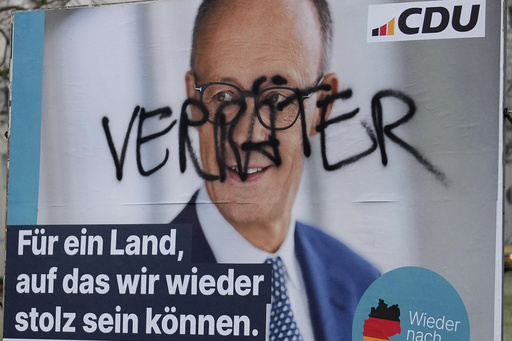Tens of thousands of individuals in Germany took part in demonstrations over the weekend, expressing their opposition to Friedrich Merz, the center-right political leader and leading candidate for the upcoming February 25 election. The protests were sparked by Merz’s proposals for stricter migration regulations that gained support from the far-right Alternative for Germany (AfD) party.
Residents in cities like Hamburg, Munich, Cologne, and Leipzig voiced their outrage, claiming that Merz and his Christian Democrats violated a post-Nazi consensus upheld by all democratic factions, which was to refrain from passing any laws with the backing of far-right entities such as the AfD.
Last Wednesday, Merz introduced a nonbinding parliamentary measure that sought to bolster border control efforts by advocating for the return of a larger number of migrants. This proposal barely passed, aided by votes from the AfD.
Merz’s efforts appear aimed at demonstrating his Union bloc’s commitment, which comprises the Bavarian CSU party, to reducing irregular migration, particularly in light of a recent tragic knife attack committed by a denied asylum seeker.
Despite his intentions, the German parliament turned down his proposed legislation for stringent migration controls on Friday. This marked a significant moment as it reflected ongoing controversies regarding the mainstream response to far-right ideologies in the context of the upcoming elections.
Critics, including protesters and figures from the left, accused Merz of breaching an important political boundary and jeopardizing the established protections against Far-right influences within mainstream parties. Merz maintains that his stance remains unchanged and asserts that he does not collaborate with the AfD.
Protests escalated to intense levels, with hundreds temporarily obstructing the Christian Democrats’ offices across various cities. In a significant gathering in Berlin on Sunday, approximately 20,000 individuals united for a large rally.
In Cologne, protestors showcased their dissent creatively, taking to the Rhine River in 350 boats, as reported by local media. The vessels formed a scenic backdrop to the city’s iconic cathedral, with participants holding signs bearing messages like “No racism” and “For democracy and diversity.”
Current polling indicates that the center-right Union, the party behind the contested migration initiative, is leading with around 30% support. The AfD follows with approximately 20%, while the Social Democrats and Greens remain further down in popularity.
Merz appears to be banking on a dual strategy: projecting the Union as resolute in addressing migration issues while undermining the appeal of the AfD, all while positioning the current governing parties as disconnected from public concerns regarding immigration.
The AfD, which has been active for 12 years and entered the national parliament in 2017, gained momentum largely due to former Chancellor Angela Merkel’s 2015 decision to accept a considerable influx of migrants into Germany.
A year prior, mass protests emerged across the nation in response to the growing influence of the far-right, igniting concerns about threats to immigrant populations, including those who are naturalized citizens.



